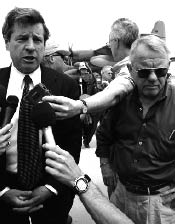Stuff Happens, Again and Again: No End in Sight
by George Sax

There’s a brief amateur video sequence in Charles Ferguson’s No End in Sight, shot by unidentified private security guards in Baghdad around three years ago. Someone inside an armored vehicle has aimed a camera at the windshield as someone else fires an automatic weapon at passing civilian cars, apparently at random. The cars crash as the guards’ vehicle speeds on and laughter is heard.
This abbreviated episode chillingly recalls recent news accounts of murder accusations against security personnel in the employ of Blackwater USA, a major private contractor with the American government in Iraq. (It also vaguely recalls some material in Paul Haggis’ current feature, In the Valley of Elah.)
Ferguson, a former information technology entrepreneur with stints as an MIT lecturer and resident scholar at the Brookings Institute, has debuted as a documentarist with a hard-driving, efficiently organized indictment of the Bush administration’s prosecution of the war in Iraq. Ferguson has marshalled facts, archived film and video, and a number of opinions from interviewees into a somewhat narrow-gauge but often sharply effective film.
No End begins with a quick run-through of the American invasion’s pre-history, including the US tilt toward Iraq President Saddam Hussein during his 1980s war with Iran, the first Gulf War and the administration’s steam-rollered buildup to the 2003 invasion.
Ferguson is particularly effective as he homes in on, and extends his case against, the stubbornly blinkered, illusion-ridden assumptions of the White House and the Defense Department, and their stunningly slipshod preparations, or lack of them. There are many of the usual perps and offenses against reason and decency. Defense Secretary Rumsfeld smugly tells reporters that the post-invasion breakdown of order and law in Baghdad is “little understood” and “complex for people to understand.” (He didn’t include himself and his colleagues, of course). “Stuff happens,” he says.
More interesting, and even more devastating, is Ferguson’s presentation of the disastrous presumptions and preemptory behavior of the people running the occupation, starting with its leader, Ambassador L. Paul Bremer, as he dismisses the home-grown resistance as “a few bitter-enders.” Intelligence journalist and historian James Bamford tells an interviewer, “I don’t know what they were smoking.”
No End quickly moves from interview excerpts to archival film and video (narrated by actor Campbell Scott) and back, to sometimes penetrating effect. The interviews are really the heart of Ferguson’s movie. At one juncture, former Deputy Secretary of State Richard Armitage answers a question about one decision-making disaster by tensely disassociating himself from the administration’s leadership: “They’ll have to account for it themselves.”
No End doesn’t really reveal anything new. The great bulk of what it contains has been gone over before, most impressively by public television’s Frontline programs and the network’s reports by Bill Moyers. And, a little curiously, it avoids featuring the implicit cheerleading of mainstream and liberal news media, like the pre-war articles by Judith Miller and Michael Gordon in the New York Times. There is also an absence of any political figure, in either the supporting or opposition camps, despite Ferguson’s reported highly placed contacts.
And in a period when even a neo-con scavenger and influence-monger like Richard Perle can say he might not support the war now if given a second chance, attacking the Bush administration’s ideology-driven stupidity rather than the basic ideas behind the whole calamitous enterprise can seem at least a trifle narrow.
But No End is nevertheless a highly useful, comprehensive primer on the arrogant, bellicose incompetence that produced and still sustains the bloody debacle.
|
Issue Navigation> Issue Index > v6n39: Into the Biennial (9/27/07) > Stuff Happens, Again and Again: No End in Sight This Week's Issue • Artvoice Daily • Artvoice TV • Events Calendar • Classifieds |









 Current Issue
Current Issue